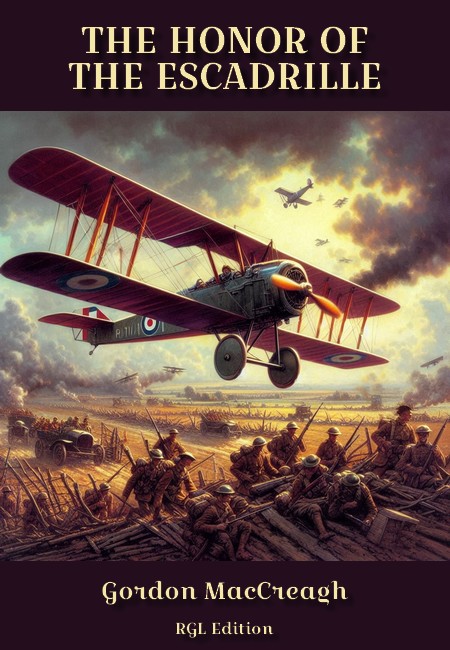
RGL e-Book Cover
Based on an image created with Microsoft Bing software
Roy Glashan's Library
Non sibi sed omnibus
Go to Home Page
This work is out of copyright in countries with a copyright
period of 70 years or less, after the year of the author's death.
If it is under copyright in your country of residence,
do not download or redistribute this file.
Original content added by RGL (e.g., introductions, notes,
RGL covers) is proprietary and protected by copyright.

RGL e-Book Cover
Based on an image created with Microsoft Bing software

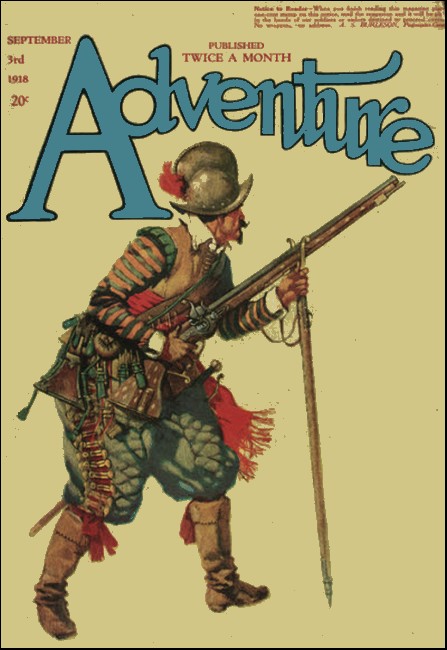
Adventure, 3 Septemer 1918
with "The Honor of the Escadrille"
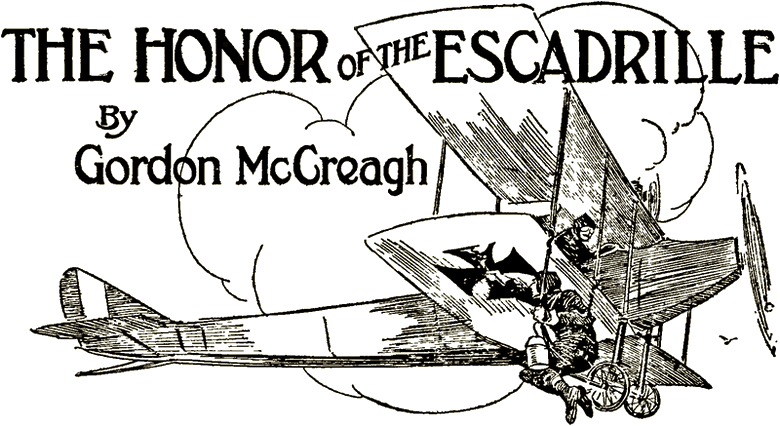

HE general in command of that difficult and important little wedge which nosed into the flat ground before the Hautebois woods sat in his headquarters cave immersed in a sea of maps and surrounded by an alert gathering of staff officers and telephone operators. Out of the vaulted dimness to the right a field-telegraph clicked incessantly. The general stabbed angrily with his compass point at a spot colored red on the map before him.
"Ces sales Boches là!" he spat, through his bristly grizzly mustache. "Always they appear to have knowledge of what we purpose. Ss-s-saprist'!"
He swung in his chair and turned to a tall officer who wore the coveted device of the double wings. He addressed him in English.
"Meestaire Reynold', you will 'ave ze goodness, yes, and send up one of your so brave boys to make obsairvation wis all speed."
"Tout' suite, mon Général." Captain Reynolds saluted and strode from the dug-out.
Outside he jumped into one of the swift autos distinguished by the tiny staff pennant and indicated the hangars half a mile distant. In another minute he was among his own boys of the Escadrille. No need to explain which escadrille, there is but one, those hard-flying, hard-fighting young adventurers to whom even the French aviators take off their hats.
For extreme accuracy it might be added that Captain Reynolds was in command of Flight D which had been specially detailed to that important section. In his little office partitioned off from the quarters he consulted a memorandum sheet of daily operations; then he stepped out and crooked his finger at a lithe, brown-faced young man who jumped to meet him.
"Not exactly your turn, Mackensie; but I want a good man. I wish you'd go up and see if you can find out anything across the line."
Second Lieutenant Mackensie saluted and ran out to his machine. At the door he halted for a second.
"Observer?" he asked.
"No, make it a single hop; and hurry."
A moment later Reynolds followed him, He was already climbing into his machine while a mechanician spun the great propeller. Reynolds called to him.
"Wind, twenty-seven; and strato-cumulus, fifty-five hundred."
Mackensie glanced up at the clouds and nodded quickly. Then to the mechanician—
"All ready?"
"All ready, sir."
"On!"
The mechanician heaved down on the propeller blade and swung sharply clear to the right. The great fins spun twice with a heavy blip-blip and then swung stiffly back to the horizontal.
"Off!" called Mackensie as he pressed down on the ignition button.
The mechanician cranked the propeller over for a few turns.
"On!"
"On!" said the mechanician and heaved sharply down once more.
This time the engine caught up the ignition with a roar. Mackensie wasted no time in "warming up."
"Let her go!" he shouted.
The other mechanicians who were bracing themselves against the thick entering-edge of the great planes ducked quickly under, and the machine shot away from them, overcoming its inertia with unbelievable speed under the tremendous thrust of its hundred and fifty horse-power engine. Almost immediately Mackensie pulled back on the elevating controls, and without a bump the great machine glided into its own element. Mackensie drew out the gas lever to the last notch and pulled the control almost to his chest. The machine pointed its nose to the sky and whirled the blue smoke from the exhaust to fan out against the grass.
"Whew! He'll tail-slide if he don't watch out," gasped a mechanician.
But Lieutenant Mackensie knew his machine as he knew his own soul. In less than five minutes he disappeared behind a scurrying woolly cloud. Five thousand, five hundred feet, the altimeter read, just as his commander had said.
One of the flyers lounging at the hangar door nodded with appreciation.
"Nice clean climb," he remarked casually.
"You said," agreed another. "'S more than the Hun can do as yet—well, hope he gets back."
"Uh-huh."
And the group turned into the hangar again. The assenting grunt was the only indication which these quiet men vouchsafed that their comrade had gone to play with death on even chances.
Mackensie did get back. Within the hour he suddenly shot through a white cloud like a falling meteorite. Nose-down he swooped, almost vertically, never flattening till within a hundred feet of the ground. Then he glided into the horizontal and a minute later he skimmed the grass with a precision which rolled his machine to the very doors of the hangar. The wings and fuselage were spotted with neat little round holes, almost a hundred of them. Mackensie climbed out of his perch and pushed the goggles up into his hair.
"Couldn't get a darn thing," he growled. "The air is just buzzing with hostiles and they kept me above the cloud-level all the time. Dived into a hole once and got a glimpse of a million anti-air guns and then a swarm of them chased me."
He strode into the quarters to make out his official report.
It was a cryptic document which he evolved. Below the entries of air conditions and time of departure and return came the following riddle:
Made enemy's lines at six thousand. Immediately H. A. appeared under my tail, firing. Side-looped and got broadside position, got in fifty rounds Lewis at a hundred. H. A. went down in spin. I was following, when attacked by another H. A. on my tail. Went off on the wing and climbed. Got on his tail, got in good burst of a hundred rounds. H. A. looped reverse. Two more H. A.'s below me. Climbed to fourteen thousand before got clear.
There was more to the same effect; a whole sheet of technical enigma, grimly redolent of battle and murder and sudden death. Interpreted briefly it meant that he had been attacked by an H. A., which meant hostile aeroplane, had escaped by clever maneuvering, had attacked in turn, been attacked again, had taken his turn once more, till finally ever-increasing numbers had driven him off. The condition of his machine showed how fierce had been the fighting.
Captain Reynolds skimmed through the report with a practised eye.
"Hm. Couldn't get any of them?"
"No luck at all. I don't know about the first; but they were too many for me."
Captain Reynolds frowned.
"'S too bad. I never saw such a rotten run of luck as yours. Well, I'll report to the general. Maybe he'll want the whole darn squadron out, though we can't do much with these clouds so low."
But the general saw reason. He realized the impossibility of getting under the cloud-level in the face of the enemy's flyers, to say nothing of the anti-aircraft guns which were dangerous up to ten thousand feet. The attempt had to be postponed, then, to wait for more propitious air conditions. The general chafed, for the enemy truly showed a diabolical knowledge of his plans.

MEANWHILE Mackensie, after his short hour of duty—which, however, involved more nerve-strain than a whole day in the trenches—was sprucing up for a holiday. He had washed voluminously, shaved carefully, and was now attending with methodical exactness to the final details of his well-kept nails. One of his reckless fellows on whose hands time hung heavy pounced on him.
"My, my, look at Mac all camouflaged up like he was going to a wedding! Where away, Mac?"
Mackensie dodged the issue.
"Engine throws oil something fierce. I must get my mechanicians after it."
"Doubtless, old acrobat, sans doubt; il faut qu'on jump upon the cochons avec both feet. But that don't say what all the disguise is for."
"Well, if you must know, since I've done a day's job I'm going out to relax and jeer at you poor ticks who have to stick around."
"Hear him, fellers. Listen to the leisured patrician. But again I demand, where? Where d'you find all this amusement in this so lugubrious vale of tears?"
Mackensie suddenly grinned at him.
"Hospital," he said laconically.
There was a shout from the rest
"Ha! Ha!"
"Wily fellow!"
"Leave it to a canny Scot all the time. Which one is it, Mac? I'll bet it's that tall blonde."
"No it isn't," shouted another. "I know. It's Miss Levasseur. Mac's trying to cut in on Watso here."
The young flyer mentioned flushed angrily at the suggestion.
Mackensie smiled on them easily.
"Wrong again; I'm going on a matter of business."
The crowd greeted this preposterous subterfuge with prolonged howls, and only ceased from their exuberant derision when Captain Reynolds came in and held his hands over his ears. He took a seat on an upturned uniform-case, and it was evident that there was something on his mind.
"Boys," he began slowly, "we've got to do something."
"Sure, Cap'n, let's," came unanimously from the crowd. "What shall we do?"
"No, this is serious, boys. It concerns us as a bunch. The old general is a white man from way back and he's not saying anything, but it's a fact that he's worried about the Huns getting all the information they want. Now it's up to us, boys; I feel that the honor of the outfit is at stake."
His hearers stirred uneasily at this imputation, slight though it was, that they had fallen short in what was expected of them.
"Gee whiz, Cap'n. I hope the general don't think that way. That's pretty strong. But I don't see how anybody can blame us. I'll bet we're keeping our air as clear of observers as they're keeping theirs."
The captain gave a quick sop to their pride.
"Of course, they've put their best men against us here. I suppose that's a compliment to us, but—"
"Well, we're holding them even at that," a stocky youth broke in hotly. "Spite of the fact that they've got more machines."
"I should say. Why, that ground is just sprouting hangars and A.A. guns; there's five big shacks and two more going up. But at that, as Billy says, we hold them even every time. No, sir, if they're getting information about the general's works it's not from their sky-observations; it'll be their intelligence system; spy stuff, that's what."
The captain nodded, but without enthusiasm.
"You're right, boys, I know. But it's results that the general looks at; we've just got to do something to put a crimp in their gang. We've got the reputation of all Uncle Sam's flyers to keep up, and, by cripes, we're not going to fall down on it."
"Right, Cap'n! We will!"
These men were not given to wild bursts of cheering or spasms of spectacular emotion—a matter which always amazed their French confrères. They had no emotions as a matter of fact, and all their nervous reactions were strictly under control; but each man felt a glow of hard determination at their captain's quiet confidence.
"Well, I'm going to see if we can get any photos tomorrow," the captain resumed. "I'll have Decker go up with some of you; he's got all his apparatus ready. I'll slate you for first hop in the morning, Watson."
Watson looked up with a sudden frown and he shifted uneasily on his seat. Presently he made bold to speak. His words were nervously formal.
"If you don't mind, sir, I'd rather take up somebody else."
The captain was surprised.
"Frankly, sir, I—I don't like 'Heinie' Decker." He laid emphasis on the name. "Nothing against him personally, sir, nothing at all; but—well, it's his name, and—he was born on this side too. I suppose it's prejudice, but if it's all the same to you I'd rather take up somebody else, anybody else."
A series of nods and a grunt or two signified that others of the men felt the same way.
"Ah, what's the matter with Heinie?" broke in Mackensie. "He's the best photographer in the outfit."
"Maybe, but aerial photography is no longer a matter of the individual observer, it's a matter of apparatus and the expert in the developing-room."
"Not entirely, Watso, my son, by no means," replied Mackensie. "It's still up to the observer to know just when to pull his exposure lever; he's got to judge the best position and the best light. Give Heinie to me, Captain; let me have him for keeps, and I'll bet we get more valuable pictures than any of you fellows."
Captain Reynolds looked relieved.
"Very well, if it's so easily settled. I know how some of us feel about the misguided fanaticism of the German-born mind. I'll schedule some other man for you, Watson. And results, boys. That's what we want from now on, results!"
The captain's tone indicated that the serious side of his business was accomplished. Mackensie heaved his lean length from his seat.
"Well, if that's settled, Captain, I've got an important business engagement at the hospital."
Once again the howls of derision rose. Mackensie turned in the doorway and smiled slowly on his fellows with impassive eyes, and then he disappeared. Watson looked after him sourly.
"Huh, results," he muttered, his mind still half-engaged with the captain's exhortation. "If I'd been out on that last observation I bet I'd have got at least one Hun machine."
"Hark at the boy!" laughed a man who carried the coveted decoration of the legion on his chest. "He'd have crashed a hostile. Man, lemme tell you that Mac there is one of the best flyers we have."
"Well, you don't notice that he rates any stars, do you?"
The disgruntled youngster referred to the tiny stars which some of the flyers with a whimsical recollection of their own wild and woolly West painted on their machines to correspond to notches on a gun.
"Luck, pure luck, boy, and you know it. Why, even Barker piloted a scout for two years before he made a kill. Shake it off kid; you're just jealous because he's gone sparking your girl."
The man of experience smote him on the back with fatherly good fellowship. But Watson was very young; and it was quite true, he was jealous. He remained gloomily morose.
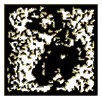
HE hung about the quarters with restless preoccupation; then he went out to inspect his machine, but before he got 'round even to the rear brace-wires he gave it up and drifted back to the quarters, a worried expression on his smooth sensitive face. Finally he screwed up all his courage and went to his commanding officer. Since there was apparently no prospect of any serious work that afternoon, he preambled, might not he take a couple of hours off?
Captain Reynolds had to laugh out loud at the transparency of the boy.
"Run along, Watson, run right along," he said. "I guess I'll know where to find you if you're wanted."
The captain's guess did not require any great perspicacity. Watson went, almost at a run, straight to the hospital. For an interminable ten minutes he was unable to find his quest, and his face flushed fiercely as he thought of some cozy hidden nook. And then, all of a sudden, he came upon her sitting innocently knitting with two or three other nurses who were off duty.
It was such an agreeable surprise that it was quite a disagreeable shock to his preconceived suspicion. He lost no time, but with that swift American confidence, which always bewildered the girl, he proceeded to cut her out from the bunch and segregate her to himself. After the tide of the first voluble fifteen minutes had abated somewhat his earlier jealous suspicion found time to insinuate itself once more.
"You know," he said half-apologetically, "I thought Lieutenant Mackensie had come to call on you."
The girl's pretty eyebrows lifted with her shoulders in a gesture of surprised denial.
"On me? Mais quel blague! How you are fooleesh. Non, he come to see ziz Monsieur Dunois, zis capitaine of ze ingénieurs."
"Engineers! Then maybe it was business. Well, I thought—some of the fellows said he was coming to see you."
The girl could not resist the instinct of coquetry; particularly since she knew that she pouted ravishingly. She executed the maneuver now.
"Vraiment? But no, he does not interest me. Howevaire, eef he would wear hees so beautiful costume national it should be different, ma foi, oui. Il est Ecossais, n'est-ce pas?"
Watson was not deceived for a moment; he laughed.
"A Kiltie? Well, I don't know. I suppose so, but his accent, if he has any at all, I should say would be more like a German's."
"Ye-es? Well, I 'ave not ze so good fortune zat he call on me; Il est bel homme, ce Monsieur Mackensie."
She pronounced the name with the broad French "A" and the accent on the last syllable.
"Yeah, he is—" Watson who had begun to admit grudgingly his supposed rival's physical perfections, stopped with a sudden catch of the breath.
Something in the girl's intonation had struck a dormant chord in the back of his brain and waked it to acute perception. He knew instantly that it had been there all along.
"Mackensen!" he burst out loud.
"W'at you say?"
"Oh, er—oh, nothing. I just had a funny idea, that's all."
He laughed off his little effusion and proceeded to make love to the girl with the assiduous speed of the man who knows that life is short. But he was not up to form; he was preoccupied and his mind wandered. Presently even the girl's charm could not wholly distract his thoughts from this new thing which hammered at his brain with ever-increasing insistence. He knew that he was becoming dull, and with rare wisdom he forged an excuse and took his departure before he should appear stupid to the girl.
He made speed to get back to the quarters; he could hardly contain himself. He pounced on his friend Britten, a young daredevil of his own age, and drew him away from the crowd.
"Jim," he burst out. "Did you ever notice anything about Mac's accent?"
"No," said Jim. "Why? Hold on though, I think I did, yes."
"Well, did you ever think of his name? No? Well, pronounce it the French way and see. Now just shift the last two letters a bit and take the accent out of the middle. How's that? Mackensen! Von Mackensen! D'you get it?"
The other gasped.
"Aw, rats, Watso. That's a crazy idea."
"Is it though? Just think! Look at him. He's got that cold, deadly method in everything he does, hasn't he? And you saw how he jumped for Heinie Decker this morning. And—" Watson spoke with slow emphasis—"they say he's the best flyer in the outfit, but you notice that he never brings down a Hun machine."
Britten laughed uneasily.
"Shucks, Watso. You're letting your imagination run away with you. You're just jealous because he went after your girl."
"He didn't though," maintained Watson with dark insistence. "And I'm not having imaginative brainstorms either; you add it all up and see how it hits you. And—gee whiz! I never thought of that! Where are the Heinies getting all their information from?"
Britten laughed again, but there was uncertainty in it this time. However, he rejected the monstrous insinuation.
"Oh, come along, Watso," he said. "Your suspicion is unworthy. Forget it."
"Maybe it is," insisted the other defiantly. "But I'm not going to sleep over it; you can bet I'll keep my eyes skinned."
Britten argued with him, but feebly, and finally he, too, agreed that possibly, after all, there might be—well, it would do no harm to watch anyhow.
The watching during the next few critical days revealed nothing. The lean, inscrutable flyer with the doubtful name and the observer whom he had so eagerly chosen, about whose name there was no doubt at all, made several flights together, and presently the former was going about the camp cheerfully joshing his fellows and making invidious comparisons about their respective photographic observations and trying to lay bets that he and his teammate would continue to surpass the efforts of the others. Some of the foolhardy betted—and they lost, always.
Britten called the attention of his suspicious friend to the fact. But Watson only shook his head with dogged insistence.
"Shucks, what's a few photographs of unimportant terrain? That don't, mean anything, even if they are technically perfect. And I'll tell you what. I'll swear my soul that I heard them talking German together. You just lay low and watch out."
Then the Mackensie man was noticed to be holding long, guarded councils with his friend, the upshot of which was that he shook his head and muttered regretfully—
"They'll never give us a chance to do it in a million years."
"On our own hook then," growled Decker with sturdy determination. "In the air we make the change."
"Gosh! Can we?"
"Sure," muttered Heinie. "You just fly her. Mine is the rest; so, I tell you."

FOLLOWED more quiet conferences, and the next thing, the two had taken a big Morane biplane, and while mechanics overhauled the engine, they personally proceeded to connect up an intricate maze of control-wires, and finally they mounted a stubby black steel cigar with a small propeller at the front end on the top of the upper plane. Watson just had to go and look into the matter.
"What's the stream-like thing on the roof?" he asked casually.
Mackensie shot a quick glance at him from under his straight brows.
"Servo-motor," he said shortly. "Works by wind pressure."
"Servo? What for?"
"For a Sperry gyro-stabilizer."
"An automatic stabilizer? Cripes, you can't fly with them!"
"Can't you!" Mackensie took up his challenge. "Son, it's already two years ago since Laurence Sperry went up five thousand feet and then climbed out of his seat and walked out to the end of his wing!"
"Yes, I know. But what I mean is, since every dip and roll is immediately corrected by the gyroscopic control you can't do any quick maneuvering."
"Do tell." Mackensie was exasperatingly sarcastic.
But Watson was not to be diverted by any such transparent subterfuge as a forced quarrel.
"What's it for?" he asked bluntly.
Mackensie stood up and looked keenly at him. Decker from behind his back made some quick signals and mouthed something with silent distinctness. Mackensie took it all in without shifting his gaze from Watson's face, and then he smiled his thin silent smile.
"It's for special photographic work," he said evenly; and then he added a disarming postscript. "For details apply to Captain Reynolds."
For a moment Watson was staggered; and then it occurred to him instantly that two such clever spies would surely have found no difficulty in inventing some plausible story which would gain them permission to experiment with the new machine. He called them spies openly in his own mind now, and half he was impelled to go to his superior officer with his suspicions.
But he had not quite enough evidence yet, he reflected. Give them a little more time and they would presently weave a rope long enough to hang themselves with, he said to himself. So he pretended a casual interest and presently got away to consult with his friend Britten.
Mackensie looked after him with narrowed eyes.
"That young fool is going to give us trouble, Heinie," he muttered.
"Too slow," said Heinie phlegmatically. "Already this afternoon we can do it; look at the clouds."
Mackensie nodded. The cloud formation was a low cumulo-nimbus, heavy and dark. Behind them lay shelter and concealment. But the flyer's forehead puckered.
"It's a frightful chance, Heinie," he murmured soberly. "Their own guns'll probably drop us long before we can land in their lines with my precious little packages."
"Neffer," maintained Heinie stoutly, "when we do as I have suggested—"
"And that's a frightful chance too, my friend. That's going to be an awful stunt to pull off."
Decker's pale eyes gleamed with fanatical fire.
"For the sake of the cause which we do," he growled fiercely, "I take twice such a chance."
After the noon hour that same day Watson saw Decker carrying out his intricate camera and attaching it with long bolts to the side of the fuselage just below and a little to the rear of the observer's seat. He wondered for a moment whether, after all, the photographic story might not be true; and then he laughed at his own simplicity and told himself, no, they would never overlook such an obvious give-away. He would just keep watching, he determined, and sooner or later something would fall to his vigilance.
But "too slow" had been Decker's terse estimate of him. He had failed to take into consideration the swift efficiency with which these two men did their work. It was not till everything was ready for the start that by a sheer stroke of luck he saw Mackensie furtively hand a few packages up to Decker already in the observer's seat, neat fat packages of oiled paper about ten inches long.
Suddenly it came to him that it was now! That whatever these two contemplated was going to be done right away.
"Maps," he gasped to himself. "Documents!"
He rushed across the field toward the machine shouting and waving his arms wildly.
"Spin her over!" roared Mackensie to the mechanic at the propeller. "It's on!"
"On!" shouted the mechanic and spun.
Watson's heart came up into his mouth as the engine took up at the first attempt. But this machine was heavier than the usual fast scout which Mackensie drove; the mechanicians had to hold it for a few seconds till the engine picked up its full speed. Watson came racing, clawing along the tail of the fuselage.
"What have you got in those packages?" he yelled.
Mackensie looked down on him and grinned with malicious triumph.
"Ask Captain Dunois over at the hospital," he shouted above the roar of the engine. "Let her go, there!"
The great machine sprang forward and skimmed the grass. Watson was left shrieking and running wildly after it.
But only for a second. Swift presence of mind is one of the first requirements of a fighting pilot, and Uncle Sam's boys have always passed through more severe tests than any of the allied flyers. In another second Watson was racing for his own fast scout which bore the deadly Vickers gun pointing grimly over its nose.
As Mackensie circled to the higher levels he saw him climbing in while there was a rush of mechanicians to the propeller. His face grew hard with annoyance.
"— young fool! He'll be shooting at us next," he growled. Then with a shrug of unconcern: "Well, I'll hide in the cloud-bank. And if he can follow me there he'll be some flyer."
He certainly would. Flying through the clouds is one of the deadliest trials which an aviator has to face; infinitely worse than flying by night. But Mackensie set his planes in a long slant for the dark bank. Just before he cleaved into it he looked down away to his left once more. Watson's machine was just rising from the ground. Mackensie smiled his thin smile. In another second he was enveloped in heavy swirling vapor which muffled even the roar of the engine. He brought his machine to the horizontal and settled down with alert determination to a long drawn-out game of moist blind man's buff.
Presently Decker stood up in the front seat and turned 'round and waved his hands in some sort of signal. Then with cool daring he climbed out and stepped on to the footway of the lower plane as nonchalantly as though he had been going about some small job with the machine safe and solid in the hangar instead of five thousand feet up in the wet, clammy air. He cupped his hands and roared into Mackensie's ear.
"Just I have thought. What if they notice the paint is wet?"
Mackensie thought for a second, then:
"They won't. Nobody's likely to stoop and look under the plane when we're once on the ground."
Decker nodded.
"Yeah, that's right too. Well, I go ahead with the job."
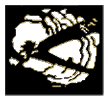
AND with no more fuss than that he proceeded with his usual slow deliberation to do an unbelievable thing. He dived an arm into the recesses of the front seat and produced a tangle of cords and snap-hooks. Then he made a sign to Mackensie and moved out on the wing surface, careful to rest his weight only on the longitudinal "I" beam and clinging to the brace-wires to keep from being whirled from his unstable perch by the hundred-mile wind which tore at his clothes.
Mackensie watched his balance very carefully and marveled for the thousandth time at the superhuman sensitiveness of the little whizzing gyroscope which detected every shade of divergence from the plane of flight. As he found how it automatically checked up against the increasing leverage of Decker's weight as he made his way out on to the wing he pictured it as a live thing with an alert uncanny intelligence of its own and he thanked its inventor aloud.
But Decker was troubled with no flights of meditative fancy; with unimaginative stolidity he wound his legs 'round the forward center strut and lowered himself to a sitting posture. He unraveled his tangle of rope which resolved itself into a crude sort of hammock arrangement. With methodical exactitude he snapped one of the hooks over the base of the strut. Then, lying on his stomach and leaning far over the hurtling abyss, he groped with his arm and presently the other hook snapped comfortingly into an eyebolt.
Then he straightened himself out again with slow caution and returned as carefully as he had come. From the wonder cabinet of the front seat he now lifted, of all unlikely things, a couple of pots of paint and a brush. He leaned over to Mackensie and held up the spread fingers of one hand three times.
"Fifteen minutes," he shouted. "'S all I need."
He fought his way out again and lowered himself as before. The pots of paint were disposed of over the edge of the wing, evidently on to hooks below; and then with a cheerful wave of the hand the crazy fanatic slid over into his swaying, straining net.
Mackensie flew on with a tense face through the clinging mist and began to wonder. He wondered if he would feel a lurch if his partner in this wild venture should be shaken out of his awful perch. But no lurch came. Decker, working with iron nerve and sure swiftness painted out the target-circles with which the Allies distinguish their machines and painted in the great black cross of the Germans.
There was no hitch, no accident; everything had been thought out and prepared in advance. In less than the fifteen minutes which he had demanded his round face appeared over the edge of the wing and he wormed his body up after it like a stocky eel. He collected his paraphernalia and returned as before. Mackensie snatched a hand from the steering-wheel and slapped him on the back. Decker grinned back at him and proceeded to climb over to the other side. Mackensie flew like a Japanese ladder balancer who supports a bamboo ladder on his feet while a slim youth in tights climbs about on it and does hair-raising stunts.
In fifteen more minutes Decker crawled out from under the other wing. He was grinning all over like a boy who has been up to mischief; but his face grew fierce as he stooped over Mackensie.
"Goot. It is finished," he shouted. "Now it is in your hands, the great plan. Forwards, and goot luck!"
Mackensie gripped his hand once, and then he drove his machine in a long glide through the cloud-belt to get his bearings. They were far to the south and well over the enemy's lines. Mackensie nodded with satisfaction and climbed again. He proposed to travel through the clear upper strata till he should come again to the Hautebois section.
After hurtling for half an hour through the emptiness—for there could be no air-scouting on a day like that—he began to recognize familiar ground through an occasional break in the billowing blanket below him. Then, far away above him his sharp eyes discerned a tiny mosquito of a machine which immediately dropped down on him like a stone. He grinned with appreciation.
"That'll be friend Watso," he chuckled, and he dived into the cloud again.
Ten minutes later his machine came to a stop behind the neat hangars and the bristling hedge of anti-aircraft guns which he had seen so often from above. Soldiers in flat, peakless caps began to run toward them. Mackensie hopped out and went to meet them. He ignored the soldiers just as though they were cattle. They were used to this: they streamed on past him. Before a slender young man who was obviously of another breed Mackensie halted, clicked his heels together and saluted affectedly.
"Gestatten Sie?" he addressed him in clean, incisive Hanoverian German. "I am Leutnant von Mackensen from the Viellegard section; I am out of gasoline. If I might beg."
"Aber natürlich, Herr Leutnant," said the youthful officer without hesitation.
All muffled up as Mackensie was in leather coat and goggles and helmet, there was no discrepancy of uniform for the other to be suspicious about. Mackensie's heart which had been pounding against his chest before the encounter began to return to the normal and he heard the officer speak again.
"Your mechanician will attend to the matter. Permit that I escort you to the quarters and offer you some refreshment."
"I thank you, no," said Mackensie hurriedly. "I have not the time to spare; already I should be back, Excellenz reviews today personally."
But he showed no immediate disposition to go. Instead, he stood engaging the young man in conversation while he saw Decker alight and establish friendly relations with the soldiers. Decker could do with refreshment if there was any to be had, he proclaimed thirstily; and the soldiers grinned and winked and led him into the hangars. Mackensie conversed with the young officer. He knew from his accent that he was a Berliner, and to avoid any awkward questions about the operations further down the line he immediately lied glibly, inventing a fascinating story of having just come back from leave in his home town of Hanover.
The officer was immediately interested, and Mackensie wondered wildly what he could answer to the eager questions about Café Kröpke and Weltman's. For half an hour he fenced with him, and then, seeing Decker in ostentatious evidence beside the machine, he remembered affrightedly the haste which was incumbent on him. With the deepest reluctance he tore himself from such pleasant company.
As he climbed into his seat he whispered to Decker—
"Plant all the packages?"
Decker nodded.
"Camera ready?"
"Sure, everything. Hurry."
"Parat?" called Mackensie to the German hangar crews. "Also—los!"
The engine took up beautifully, and in another minute the machine was soaring over the hangars in a wide circle.
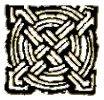
AT the same instant aviator Watson was pouring his excited story into Captain Reynolds' ears, a story of rage and indignation and loathing; and he clinched his testimony by asserting, almost weeping with the beastliness of it, that he had finally seen Mackensie's machine dive down through the clouds into the German lines.
Captain Reynolds was deadly serious.
"It's almost inconceivable, what you say, Watson," he kept repeating with undisguised grief. "But if you're so sure, and since Britten bears you out, I suppose I must take the matter to the general right away. —! What a beastly mess! Better both come with me, I think."
Twenty-five minutes later Mackensie was dropping like a plummet into his own lines. For the first time since anybody had known him he seemed to have lost some of his phlegmatic calm. He rushed Decker to the laboratory.
"Develop out quicker'n all Hades while I hunt up the chief," he barked at him, and raced for Captain Reynolds' office.
Ten minutes later again he was snatching a series of three wet prints out of Decker's hands and sprinting for the general's headquarters.
When the general heard his name he looked inquiringly at the three American officers, who in turn looked amazedly at one another.
"Qu'on l'admette, immédiatement," he ordered sharply.
Mackensie stalked in and saluted. The general was brusk.
"Well sir?"
"I have just obtained some photographs which may be of immediate importance. First, this one, from three thousand feet."
The general took it. His tone was terse.
"This represents the enemy's hangars. I have seen it before, it is nothing new."
Mackensie handed him another.
"The same scene, sir, two minutes later."
The general looked at it; and looked at it again. And the more he looked, the more puzzled he grew. Two of the hangars were still in plain view; the other three were obscured in the print by white smudges, smoky-looking smudges, with jagged specks apparently bursting from them! Mackensie chose the dramatic moment for handing in the third.
"The same scene again, sir, five minutes later on the return circle."
The general gasped. Where the five sheds had been was a chaos of twisted steel and tumbled sticks from which rose thin wisps of smoke. That was all that was apparent to the naked eye; magnification later would develop details, but it was sufficient. The general gasped some more. Then with quick French intuition he realized the awkward situation which this amazing young man's unexpected entrance had created. He was a man of infinite tact; this was a matter for home settlement. He turned to Captain Reynolds.
"Permit me, monsieur," he said with formal courtesy, "in the name of the French nation to acknowledge yet once again an unpayable debt to the Escadrille Américaine. I will request of you details—later."
The four men walked across the field to their own hangars slowly. Nobody spoke. Captain Reynolds did not know how to handle the wretched situation. They were half-way across before Watson broke the uncomfortable silence with a clean, manly confession.
"I—I've got to apologize to you, Mac," he said—he had the courage to refrain from falling into the formal Mr. Mackensie, "I've been thinking some mighty mean things about you."
"I know it, son," said Mackensie cheerfully. "Captain Dunois who helped me with my bombs learned from Miss Levasseur that you'd got on to the name."
"The name! Then it is—well you see, then, I thought you were a—I thought you weren't an American."
Watson spoke with relief; there was some mitigation for his suspicions.
Mackensie took up the inferred question slowly and rather wistfully.
"Well now, that depends on what you fellows consider an American. You see, my old dad went across before I was born. He quit the old country because he didn't like the Verboten stuff and the class distinctions, and he didn't like to be governed by the police bureau 'round the corner; he wanted to have a say in the affairs of his country. Of course, he got into trouble for Majestätsbeleidigung, lèse-majesté, you know; so he beat it over to where free speech was not a crime, and presently he switched the name around a bit and took out his papers.
"Me, I was born in God's country and raised in it too; but I went to college in Hanover, and I quit it for the same reasons as my dad and for a whole lot more; and I've always kinder regarded myself as an—"
"An American, by—! That's what you are!" Britten burst out almost as a challenge.
And the others grunted—
"You bet!"
"Thanks," said Mackensie quietly. "It does me good to hear you fellows say that."
"Well, I'm sorry, Mac," Watson apologized again. "I feel like a dog."
"Ah, don't worry, son, I don't blame you," Mackensie laughed. "I know darn well we were acting suspicious. We had to, 'cause we'd never have got permission to try the stunt—" he glanced whimsically at his superior officer—"and so I'm down on the captain's books for a bawl out."
"What I don't understand," said the captain quite irrelevantly and ignoring the last remark entirely, "is Heinie Decker."
"Oh, Heinie," chuckled Mackensie, "Heinie's a fanatic, he's a Berserk, a Mad Mullah. He was born in Alsace!"
They walked on in silence again. Their hearts were all a little too full for unrestrained speech. It was Watson with his boyish irrepressibility who broke the tension again.
"We-el," he said slowly. "I guess there's about thirty cunnin' li'l stars coming to your machine, Mac."

Roy Glashan's Library
Non sibi sed omnibus
Go to Home Page
This work is out of copyright in countries with a copyright
period of 70 years or less, after the year of the author's death.
If it is under copyright in your country of residence,
do not download or redistribute this file.
Original content added by RGL (e.g., introductions, notes,
RGL covers) is proprietary and protected by copyright.